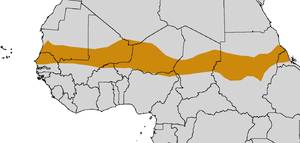2012 Sahel drought
Future droughts of the Sahel Region
The droughts are becoming increasingly more common, worse and more threatening due to global warming.[1] A possible explanation to the aridity trend is the supplements of an oceanography phenomenon called El Niño.[1] An idea is that evaporation is occurring at higher rate due to the change in Sea surface temperature, this then impacts the amount of rain the Sahel region receives[1] Another factor to keep into consideration is the response of our atmosphere to stimulants like greenhouse gases and carbon emissions.[1]

Societal impacts
Mass Famine
Valerie Amos, UN Humanitarian Chief during 2012, released a statement during the year stating that over 15 million people were malnourished in West Africa and the Sahel region.[2] The main contributor to the famine was the drought of Sahel, ensued from a combination of failing crops and El Niño.[1]
Mauritania and Chad recorded a loss in crop yield of over 50% when compared to 2011. Food reserves in the areas affected were very low and combined with corn prices soaring by 60-85% compared to averages over the last five years. In Chad alone this food crisis affected some 3.6 million people.[3] In places like Burkina Faso over 2.8 million were suffering from famine and in Senegal over 800,000 did not have enough to eat.[2]
External links
- FAO, the 2012 Sahel Crisis
- SOS Children 2012, Sahel drought
- The Guardians Poverty Matters Blog May 2012, Baaba Maal: people in the Sahel region need food and water now
- ABC News, May 2012, UN: 18 Million in West Africa to Go Hungry in 2012
- CNN, June 2012, A distress call from Africa's Sahel: Millions might starve
References
- 1 2 3 4 5 Dai, Aiguo (2013-01-01). "Increasing drought under global warming in observations and models". Nature Climate Change. 3 (1): 52–58. doi:10.1038/nclimate1633. ISSN 1758-678X.
- 1 2 Mendy Diop (May 24, 2012). "UN relief coordinator warns over humanitarian crisis in Africa's drought-hit Sahel". UN News Centre. Retrieved 21 August 2012.
- ↑ "Food Crisis in Sahel". Oxfam International. Retrieved 10 June 2012.